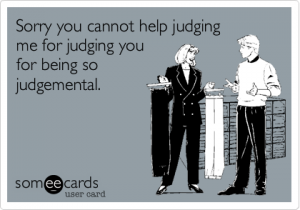“Do Not Judge” What? Was Jesus Crazy?
 As human beings living on Earth there is one thing that unites us with a common thread. Whether you are black or white, rich or poor, male or female, American, Chinese, Indian, Australian, African and everything in between, there is a single attribute that we all do…and we do well!
As human beings living on Earth there is one thing that unites us with a common thread. Whether you are black or white, rich or poor, male or female, American, Chinese, Indian, Australian, African and everything in between, there is a single attribute that we all do…and we do well!
We LOVE to judge!
We judge our spouse…
We judge our work mates…
We judge our children… (and they return the favor)
We judge the homeless man on the street…
We judge the clothes of the person sitting in front of us at church (and behind us as well)
We judge the folk on “reality TV”
We judge the status update of Facebook friends
Conservatives judge liberals…liberals judge conservatives
And Christians?
In comparison to others, Christians have the reputation of being gold medal winning athletes in the sport of “judging”. In fact historically we’ve been pretty good at turning judging into a “full contact” sport!

Which is a pretty remarkable achievement considering Jesus was pretty clear that human beings in general, and his followers specifically, were absolutely NOT to judge others! (Matt. 7: 2-5)
Jesus must have been crazy…
A Man Called Peter
Peter was one of Jesus’ key disciples. Peter also loved to judge people. In fact Jesus had to correct him a number of times whenever his little “ministry gift” reared it’s head. (John 21: 20-22)
But things really came to a head in Acts Chapter 10. God wanted Peter to meet with one of his servants by the name of Cornelius, but he also knew Peter wouldn’t meet with him without a little encouragement.
You see Cornelius was:
* A Gentile (Not of the Jewish nation)
* A Roman ( the colonial power occupying the Jewish nation)
* A Centurion (A powerful military commander of that colonial power)
However, despite having a high office in a polytheistic society, Acts 10 says that Cornelius “and all his family were devout and God-fearing; he gave generously to those in need and prayed to God regularly.”
So despite any issues, Peter, being a man of God should have no problem meeting another “God fearing man” right?
Wrong!

Peter, who had walked, ate, and sat under Jesus’ personal teaching for three years and heard over and over again how much God wanted to bless all nations and peoples, still would not (and could not) believe that God would actually want him to associate with a foreigner.
To fellowship with “other”!
The only way God could get into Peter’s thick, stubborn skull that God was bigger than the little “Jewish Christian” world he had created in his mind was direct heavenly intervention. (Acts 10: 9-17)
So Peter, with his new revelation of God’s intent, shows up at Cornelius’ house:
While talking with him (Cornelius), Peter went inside and found a large gathering of people. He said to them: “You are well aware that it is against our law for a Jew to associate with or visit a Gentile. But God has shown me that I should not call anyone impure or unclean
Acts 10: 28-29
Translation: “Even though I might see you as unclean, God says I shouldn’t judge you, so here I am”
Wow, way to win over a crowd Peter! Despite Peter’s rough greeting though, God’s Grace is revealed and Cornelius, his family, and his friends gain a deeper revelation of God through Jesus Christ and are filled with the Holy Spirit.
And Peter? Peter gets yet another lesson of how big God is and how big his love is for the world.
Not Judging…Grace’s Best Kept Secret
Sometimes I think we forget how freeing the Grace of God really is!
Consider Peter’s situation above.
Poor Peter had to spend his whole life judging people, actions, and objects as either clean or unclean, pure or impure! You know how nerve wracking and demanding that actually is?
Can you imagine having to spend your whole day doing these little mental calculations?
Eventually, you get tired of it so more and more you just associate into small, like minded groups that free you of the burden of possibly having to associate with someone or something that is unclean!
In the Christian world we call these “churches”
But God has freed us from the bondage of having to judge people
“Do not call anything impure that God has made clean.” Acts 10:15
However, in our desire to remain “holy” and “clean”, Christianity has transferred the Old Covenant laws pertaining to purity (and the huge burden it implies) into modern church life. Even when God says we are NOT to do that!
What a tremendous relief and blessing it must have felt for Peter to be freed from the need to judge.
And you know what?
You can be free too?
6 comments
Comments are closed.






Brilliant!
And also most humbling. Because even as I read your post, I found myself naming all the people I know whom I believe are guilty of judging “the other.” Consequently I continue judging others myself, and must continually seek God’s mercy and forgiveness.
Thanks Sherry…and if it helps, I point the main finger squarely at myself. But that’s where Grace comes in…
I know a number of folks in our fellowship, while they are careful to keep their “judgmental” attitudes private, have also checked their judgment (discernment) at the door. The fear is that any type of “public” discernment will be seen as being judging / judgmental. Besides that being mildly schizophrenic, how do we help / encourage people to become more discerning (using good judgement) and less / not condemning (judgmental) in a Grace permeated life?
Your example of Peter is excellent! He was clearly operating within his Jewish framework, which he had been taught since childhood. He was well within the Old Testament of “exclusion without conversion”. Was Cornelius a God-fearer from the heart or was he an “official” outer court Gentile? It may very well have been both but most certainly the former. But God was doing something new and Peter had to overcome his religious heritage, his culture, and his attitudes to be able to accept this “grace” thing.
When the church proclaims the New Testament phenomenon of Grace while at the same time teaches the Old Testament judgmental law (I need to be careful here I know) of “unclean unless converted”, are we not encouraging spiritual mental illness (a type of schizophrenia)?
Or do I just need more coffee or sleep? Or both?
Michael, I certainly feel the church has adopted both “Grace” and “law” in the way we position ourselves both internally to fellow Christians as well as outside the faith. It does give us a schizophrenic inconstancy that seems to be readily apparent to everyone but Christians.
Been thinking a lot about this recently, as it happens…
When we judge, we judge according to a standard; either our own ‘internal’ standard or a societal/cultural standard (as in Peter’s case). If a judgment is made according to our ‘internal’ standard, what we’re essentially saying is, “Am I better than this person or is this person better than me?” (of course, you can substitute the words ‘more beautiful’, ‘more intelligent’, ‘more successful’ or whatever you like for the word ‘better’). In Peter’s case he was judging from the perspective of a societal standard (God’s law – or his interpretation of it – in this case). By making any kind of judgment though, law is implied – either one that we’ve arbitrarily (and often unconsciously) made up – as in the case of is he better than me? or one society has made up (as per Peter). What Jesus does though, is to remove any such benchmark, other than the one he sets himself; a benchmark which is clearly infinitely higher than any we, or society, could ever possibly impose upon ourselves. He then proceeds to invite us to lay our (by now) very evident shortcomings upon himself. In return, he allows us to walk free from judgment; he has ‘trumped’ the law (or ‘fulfilled’ it, theologically speaking) and a never-ending cycle of grace is set in motion.
Talk more over a glass of wine or two, next month
Adrian…totally agree. Would write more but I just got back from a LONG day in China. Makes coming back over the border into Hong Kong so special. Will pick up this conversation in person in just over 3 weeks!!!!